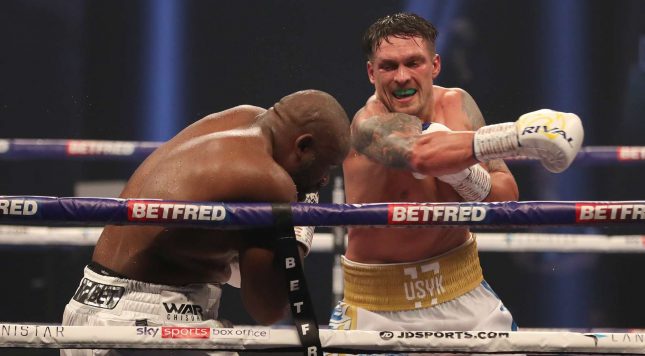Eleven years ago, David Haye challenged Nikolai Valuev in Nuremberg, Germany, in a heavyweight title bout that likely represented the greatest size disparity in modern boxing. Valuev, “The Russian Giant,” stood 7′ tall and weighed in well north of 300 pounds. Haye, a former cruiserweight, who had blown himself up to a career-high 217 pounds for the challenge, still gave away nine inches and 99 pounds in the matchup. But on fight night, the Englishman took Valuev’s belt, quite literally boxing circles around his lumbering opponent for a majority decision. The David-beats-Goliath headlines wrote themselves.
Other similar, and in some ways more impressive, feats of prodigiousness have been pulled off in recent memory. In 2007, a fresher, previously unbeaten Valuev was knocked off by Ruslan Chagaev, who was nearly as disproportionate in measure as Haye. Four years earlier, Roy Jones Jr. made the leap from the light heavyweight division to heavyweight, easily outpointing John Ruiz to swipe his title, despite a 33-pound differential. Even in defeat, much smaller men have made their mark: In 2013, Steve Cunningham floored the six-inches-taller and 44-pounds-heavier Tyson Fury, who rose from the near-knockout, rallied and soon climbed to his current heavyweight glory.
Stacked against those fights, Saturday’s main event at London’s Wembley Arena featuring Oleksandr Usyk and Dereck Chisora may have lacked a certain heft, yet still held considerable sway over the immediate future of the heavyweight division. Usyk, a 33-year-old former unified cruiserweight champ, was making his second appearance at heavyweight, with the intent of using Chisora, 36, to determine whether his formidable skills could bridge the size gap to the division’s elite. The theory, though hardly revolutionary, was sound: If Usyk (217 pounds at Friday’s weigh-in) could handle the semi-washed but notably experienced Chisora (255 pounds), perhaps he could handle more.
It’s hard to say precisely what, though — if anything — we learned as Usyk (18-0) outlasted Chisora (32-10), essentially cutting his fuel line early in the fight and waiting for the larger man to gas out in a clear-cut unanimous-decision win on DAZN.
If that sounds like faint praise, it’s worth noting that Usyk, dealt a deceptively shitty hand, played it almost perfectly. A size “advantage,” especially at heavyweight — where anything goes above 200 pounds — sometimes just translates to lead feet and love handles. (There’s a reason we don’t compare Butterbean to Muhammad Ali.) But Chisora came into Saturday’s fight in excellent condition — thick, but tight as a drum — and used his mass effectively. For all his performative pre-fight buffoonery, Chisora is, at his best, a decent and dangerous fighter, and he smartly attacked Usyk with balls-out pressure and volume punching in the early rounds, cutting off angles and frequently forcing the Ukrainian to the ropes inside a small ring.
Usyk dodged and covered up to avoid most of the serious punishment, but he wasn’t initially able to find footing to launch his own offense. Chisora simply kept coming, and for Usyk — whose one-punch power at heavyweight is nothing special — the juice wasn’t worth the squeeze. The Ukranian’s sturdy chin and knack for taking heat off heavy blows with his movement and guard ensured he didn’t slip into full-fledged panic mode, but through the first few rounds he was rarely in control and almost certainly down on the judges’ scorecards.
But by the end of round 3, Chisora was already slowing. The lull in the Englishman’s work rate gave Usyk a chance to breathe, gather his bearings and start calibrating timing and distance. In the 4th, Chisora landed a pair of big right hands early, but Usyk took them well. Sliding off a glancing jab from Chisora in the 5th, the southpaw Usyk exploded a straight left hand in the Englishman’s mug. First penalizing Chisora for his lapses, stinging him with jab counters off the back foot, Usyk gradually began leading with his offense, putting more of his punches together and further stripping away his opponent’s stamina.
As the rounds piled up for Usyk, it seemed Chisora might pack it in — or at least be exhausted into submission. At the end of the 7th, a series of Usyk combinations sent Chisora bouncing off the ropes and sucking wind as the bell sounded. In round 8, Chisora — hands lowered and head almost unmoving — was a mostly stationary target. Usyk lashed away with left hands, beating his opponent to the punch and pivoting off his hip, ahead of any counterattacks. The smaller, swifter man now had the size advantage.
Chisora briefly resurfaced in round 10, again bearing down on Usyk to land a pair of powerful right hands. But it was a fuel dump, the final angry lurches of a dry-tanked Peterbilt. Usyk used the fight’s remaining five minutes to strip the Englishman for parts.
The next step isn’t clear. If you listen to former Usyk victim Tony Bellew and the WBC, a matchup of Deontay Wilder and Usyk in a newly proposed super cruiserweight/junior heavyweight division is “the perfect thing.” Now I challenge you to go back and read that sentence several more times without throwing up a little bit in your mouth. When you’re done, consider whether Usyk would bite on such an offer and end it there.
Despite taking up boxing late, at age 15, Usyk spent a decade grinding his amateur competition into dust, before painstakingly cleaning out the cruiserweight division. Rather than settle for a counterfeit title in a half-baked division created by well-tailored grifters, it seems far more likely that the Ukranian would pursue his spectacular career arc to its logical end, pushing forward to seek out challenges against Fury, Anthony Joshua or both. If size is ever to be made to matter to Usyk, someone will first have to show him why.
(Dereck Chisora, left, Oleksandr Usyk, right; via)

